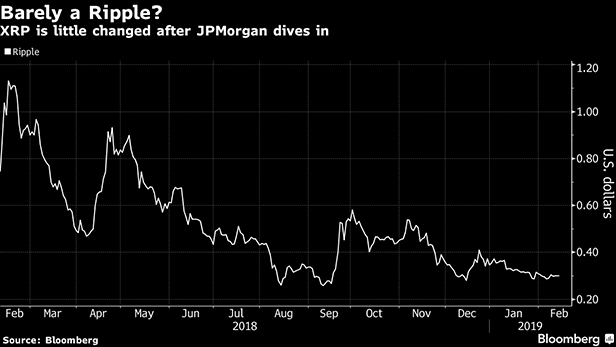The newest cryptocurrency on the block has been used in just one trial transaction, and it's already being hailed as a game-changer for digital assets.
JPM Coin, a so-called stable coin that JPMorgan Chase & Co. plans for its clients to use in cross-border payments, is a direct threat to one of the most visible blockchain companies, Ripple, and the digital currency used in its products, according to Tom Shaughnessy, principal at Delphi Digital, a crypto research boutique in New York. XRP, which can be used to facilitate faster, lower-cost international payments, is the third most valuable cryptocurrency by market value.
Ripple has made a name for itself with grand ambitions of replacing the SWIFT network used by banks, individuals, and businesses to send and receive money. In JPMorgan it meets a challenger that already moves more than $5 trillion in wholesale payments each day, meaning even a small experiment from the banking giant could have a big impact.
Recommended For You
“This is a huge slap in the face for Ripple,'' says Shaughnessy. “Ripple's target market is cross-border payments and remittances, and now JPMorgan's effort is a direct threat.''
San Francisco-based Ripple says it has more than 200 banks and payment providers on its RippleNet network, including Japan's Mitsubishi UFJ Financial Group Inc. and Standard Chartered Plc, according to its website.
An emailed inquiry to Ripple's press office wasn't immediately returned.
The JPM coin may also prosper because, unlike XRP, its value is pegged to the dollar, making it a stable medium of exchange. XRP traded above $3 in early 2018 and now trades for around 30 cents.
“The JPM Coin is a stable coin, whereas XRP is anything but stable,'' says Shaughnessy. “That's going to be a very contentious point for banks who don't want the currency in which they make payments to be volatile.”

© Touchpoint Markets, All Rights Reserved. Request academic re-use from www.copyright.com. All other uses, submit a request to [email protected]. For more inforrmation visit Asset & Logo Licensing.


